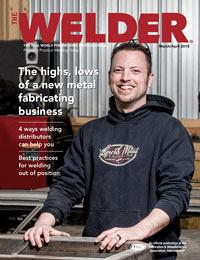- FMA
- The Fabricator
- FABTECH
- Canadian Metalworking
Categories
- Additive Manufacturing
- Aluminum Welding
- Arc Welding
- Assembly and Joining
- Automation and Robotics
- Bending and Forming
- Consumables
- Cutting and Weld Prep
- Electric Vehicles
- En Español
- Finishing
- Hydroforming
- Laser Cutting
- Laser Welding
- Machining
- Manufacturing Software
- Materials Handling
- Metals/Materials
- Oxyfuel Cutting
- Plasma Cutting
- Power Tools
- Punching and Other Holemaking
- Roll Forming
- Safety
- Sawing
- Shearing
- Shop Management
- Testing and Measuring
- Tube and Pipe Fabrication
- Tube and Pipe Production
- Waterjet Cutting
Industry Directory
Webcasts
Podcasts
FAB 40
Advertise
Subscribe
Account Login
Search
The trials, tribulations, and thrills of being your own boss
5 lessons a welder learned after a year on his own
- By Amanda Carlson
- March 16, 2018
- Article
- Shop Management
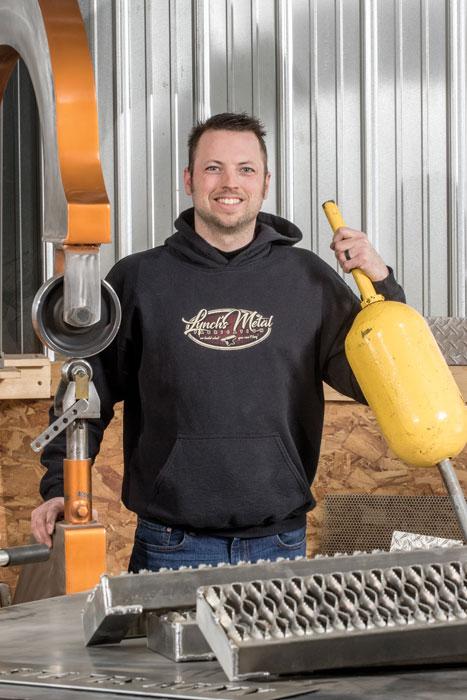
A little over a year ago, Joe Lynch realized his dream of opening his own metal fabricating shop. Nothing could ever have prepared him for the highs, the excruciating lows, and the unexpected twists and turns that followed. Every day is an adventure, and he’s never been happier.
It’s a cold, crisp day in Alto, Mich., with plenty of sunshine bouncing off the snow-lined streets. A gravel drive curves and extends into a canopy of leafless trees for about a half mile until you reach a single-story home. A small detached garage sits to the right of the home, an all-terrain vehicle parked just shy of the entry way. That small garage is where Lynch’s Metal Fabrication calls home.
A walk inside reveals a clean, well-lit shop with metal fabricating equipment lining the perimeter. A CNC plasma table sits near the back-left wall next to a shiny metal welding table, and on the opposite wall is a manual press brake with a piece of sheet that has the word “Family” written in script. It’s simple a shop, but it’s enough. For now.
Joe Lynch is leaning over his saw, with his four-year-old son Hudson looking on, complete with shop dust streaked across his nose. Roughly 13 months ago, Lynch found himself tired, frustrated, and almost two decades into a career that was neither rewarding nor fulfilling. No joy or satisfaction came with the work; just a steady paycheck. While the 35-year-old wanted his three young children to believe that they could be anything in life as long as they worked hard, he felt like a fraud.
Something needed to change.
What happened next is what many dream of doing but never find the guts to try. Lynch quit his full-time job, purchased a plasma table, and, with his wife’s blessing, jumped head first into the world of metal fabricating.
Since then, Lynch has discovered that being a one-man metal fabricating job shop has its perks, but it’s hard as hell. There are no days off, there’s no one else to blame if things go wrong, and there is no way to predict the ebbs and flows of business. As difficult as the last year of his life has been, he’s honestly never been happier.
This is his story.
Where He Came From
Lynch got into metalworking as a teenager in high school, where he took machine shop classes and fixed race cars in his spare time. The hands-on learning always interested him. The book learning? Well, not so much. He grew up in Grand Rapids, Mich., and was raised by a single mom who worked two full-time jobs to make ends meet. It was she who taught him what hard work truly meant.
After high school, Lynch went to work for a die shop in high school and then a small machine shop after he graduated. Business at the machine shop dipped after the terrorist attack on Sept. 11, 2001, prompting him to take a job as a truck driver at a large food service company. He never intended for that job to be a career, but there’s something to be said for a steady paycheck and benefits, especially after he got married and started a family.
But as time passed, his feelings of restlessness and frustration grew.
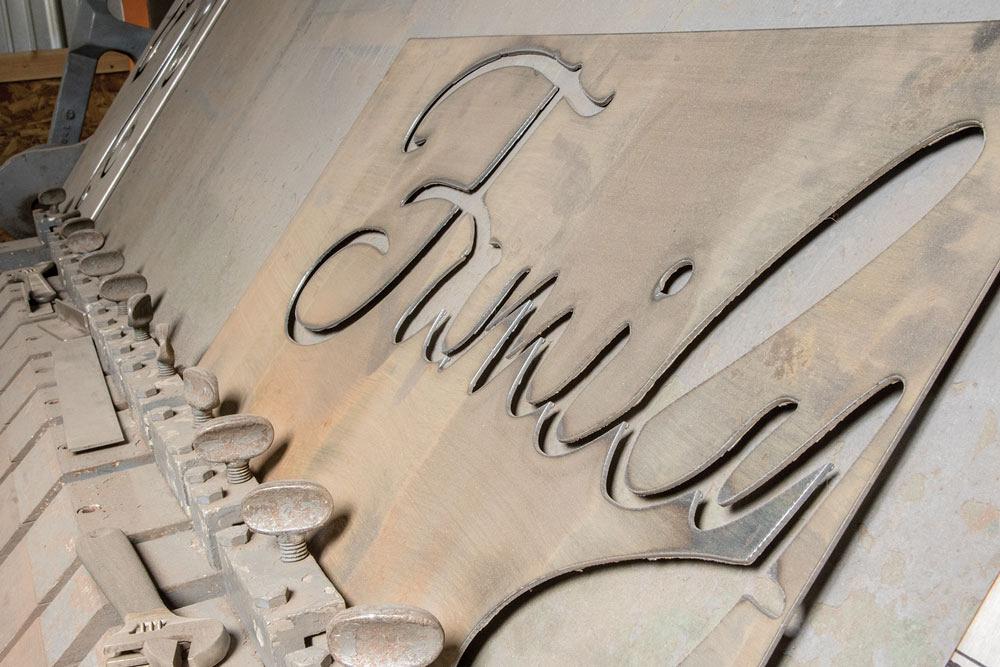
It was Lynch’s dream to make metalworking a full-time career, so one day he took the leap. He added, “Right then and there, I made that commitment to the job and to my family that I will be successful at it, no matter what it takes.”
“What am I showing my kids? When I would get home from work at night, I just wanted to be left alone. I was telling my kids they can be anything they want to be, and then here I am essentially delivering groceries. I’m not knocking that, because it did a lot of good for me, but delivering groceries was not my dream. It wasn’t what I wanted.”
Whenever he did metalworking jobs on the side, it was truly the only time he felt happy at work. One day, after a particularly hard day at work, Lynch had enough. He bought a small CNC plasma table, drove it home, and told his wife Amanda that he wanted to do metal fabricating full time.
“It was my dream to do metalworking for a long time, but I realized I’d never do it unless I just jumped. Right then and there I made that commitment to the job and to my family that I will be successful at it, no matter what it takes. You can kick me, punch me, whatever you want, and I will keep going.”
His wife gave her blessing, and he sent in his notice to his job.
Navigating the Highs and the Lows
What followed that decision was a series of high and lows, and unexpected challenges.
First, the highs.
Waking up every morning and putting in a full day’s work no longer felt like a chore. Sure, the work was hard, but he loved doing it and felt much more accomplished at the end of the day. Having complete autonomy in every aspect of business was certainly a challenge. After all, if a piece of equipment broke down, if he messed up or wasn’t totally happy with the job that he did, he alone was responsible. It was still worth it.
“I can’t stress enough how much I hated my day job. I felt like life was passing me by, and I knew I was put on this earth to do something more. It’s certainly easier in many ways to work for someone else than it is to work for yourself. You have issues every single day and you have to fix it, but I wouldn’t have it any other way.”
The first several months of 2017, business flourished. Lynch had plenty of work rolling in, he was turning a profit, and he was happy.
“Right off the bat I was swamped. I had all of these big customers and I thought, ‘If this is how it is, this is cake!’ In one month I made $10,000. Things in the beginning went above and beyond my expectations,” Lynch explained.
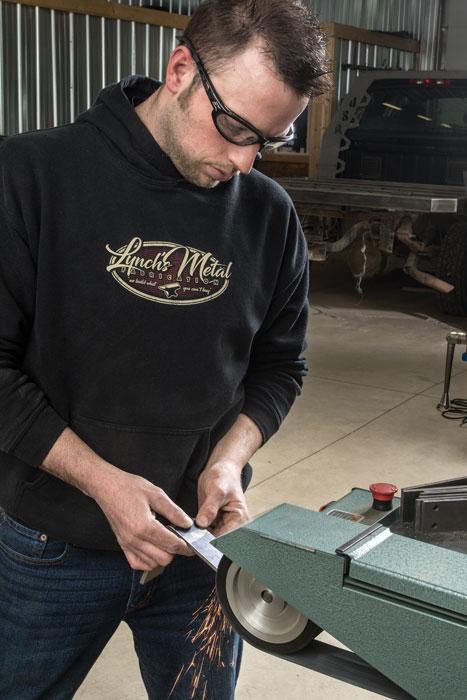
One year in business certainly does not make Lynch an expert, but the array of experiences he’s had in a relatively short period of time has been illuminating and more educational than the 15 years he spent in his past career.
But just as quickly as the highs came, they went, followed by the lows. Starting in August, absolutely nothing came through the doors. For the life of him, he couldn’t win a bid. Bills were piling up and so was the stress, and with that came self-doubt and the feeling that he had made a mistake.
“I don’t know how many times I went to my wife and cried my eyes out to her and said, ‘What the hell did I do?’ I was making great money at my old job. In those moments where I consider going back to my old job, my wife reminds me why we did this in the first place.”
Lessons Learned (And Still Learning)
One year in business certainly does not make Lynch an expert, but the array of experiences he’s had in a relatively short period of time has been illuminating and more educational than the 15 years he spent in his past career. Here are some of the lessons he’s learned along the way.
No. 1: Beggers can’t be choosers. Being creative, working with his hands, and thinking critically are the things Lynch loves about metalworking. Unfortunately, not every job that comes his way is going to afford him that luxury. And when you need work, you’ll do just about anything.
“There was this one job where all I’d have to do was cut out circles on my plasma table. I’m not trying to sound negative or like I’m above the work, but I like to use my brain. Cutting out circles on my plasma is not using my brain. I want to be challenged. I didn’t even want to bid the job, but I did because I needed the work.”
Ironically, he didn’t win the bid—he lost it by $10.
No. 2: When a customer calls, you’d better answer. The phone rang while Lynch and his family were out running errands on a rare Saturday off. It was a customer who had a job that required a fairly quick turnaround.
“They were in a pinch. I had the horse trailer hooked to the truck, it’s full of hay, my kids are in the car. I said, ‘I’ll be there in 20 minutes.’ I got there, they told me they needed 415 hangers for a powder coater by the following week. I said I’d do it.”
They returned home, called his wife’s mother to watch the kids, and got to work. Joe welded washers to a flat piece of steel, and Amanda filed them down. They worked all night.
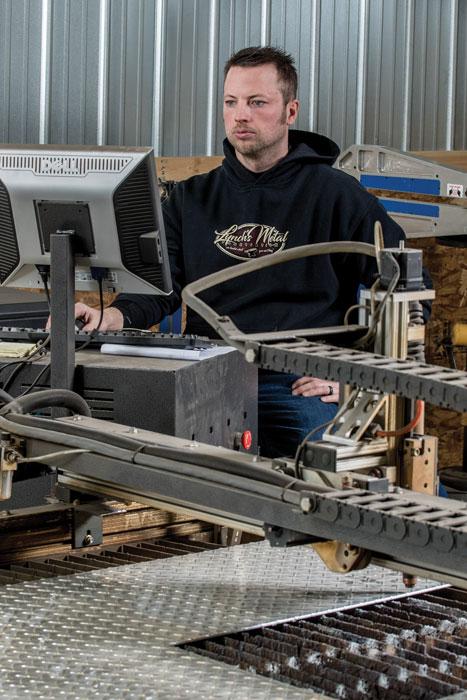
Waking up every morning and putting in a full day’s work no longer feels like a chore. Sure, the work is hard, but he loves doing it and feels much more accomplished at the end of the day. Having complete autonomy in every aspect of business is certainly a challenge, but it’s well worth it.
No. 3: Every decision you make will affect your business. Want to sleep in, maybe take a vacation day? Sure, go ahead. You can do those things when you’re in charge. But how will that affect business? Lynch’s personality is perfect for self-employment. He doesn’t enjoy sitting around, and he doesn’t believe in having free time. He likes being busy.
“This business is my life. I don’t go out with my friends anymore, and that’s OK. I don’t do a lot of the things I used to do in my free time. My feeling is, if I have four or five free hours, it can be better spent in my shop doing something productive. I don’t have time to waste anymore. I don’t have weekends anymore, and neither does my wife. We work pretty much every Saturday and Sunday because we believe in this business and we know it will take off.”
It sounds a little hard core, and maybe it is. But he has goals that he wants to achieve, both short-term and long-term. Lynch is in his shop by 5 a.m. every morning. If business is slow, he’s making cold calls or pursuing bids. In the evenings, he updates social media, trying to post when traffic on the site is at its peak.
No. 4: Be confident and never stop working. The slow periods of time and the anxiety that accommodates them certainly caused Lynch to second-guess his decision to go into business for himself. He learned that the best way to get out of those moments is to work, to take risks, to make calls, and to put himself out there. Sure, there were a lot of ‘Nos’ that came his way as a result, but there were also a few ‘Yes’ moments.
“You have to have faith that what you’re doing is right. You have to have confidence in yourself that it’s going to work out. And you can’t have that confidence if you don’t do the work. How do you stay even keel? Work. That’s the best thing I can say. There’s no such thing as luck.”
No. 5: Ask yourself, ”Do I really want this?” In his first year in business, Lynch asked himself this question plenty of times. Was it worth leaving a steady job with vacation days, a retirement plan, and benefits for the roller coaster world of small business ownership?
“No lie, it’s all about getting punched in the face and finding a way to keep going. This is what I want, and I believe that this is going to take off, so that’s my only option. My advice to anyone considering doing what I did is to ask yourself if you really want it.
“Everybody thinks it’s going to be so damned easy, and it’s not. This is the hardest thing I’ve ever done. This is not something that just goes away or gets better, but I wouldn’t have it any other way.”
Lynch’s Metal Fabrication, www.lynchsmetalfab.com
About the Author

Amanda Carlson
2135 Point Blvd
Elgin, IL 60123
815-227-8260
Amanda Carlson was named as the editor for The WELDER in January 2017. She is responsible for coordinating and writing or editing all of the magazine’s editorial content. Before joining The WELDER, Amanda was a news editor for two years, coordinating and editing all product and industry news items for several publications and thefabricator.com.
About the Publication
subscribe now
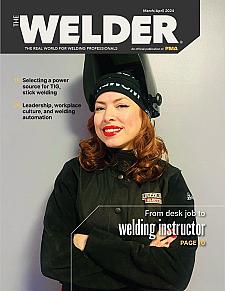
The Welder, formerly known as Practical Welding Today, is a showcase of the real people who make the products we use and work with every day. This magazine has served the welding community in North America well for more than 20 years.
start your free subscription- Stay connected from anywhere

Easily access valuable industry resources now with full access to the digital edition of The Fabricator.

Easily access valuable industry resources now with full access to the digital edition of The Welder.

Easily access valuable industry resources now with full access to the digital edition of The Tube and Pipe Journal.
- Podcasting
- Podcast:
- The Fabricator Podcast
- Published:
- 04/16/2024
- Running Time:
- 63:29
In this episode of The Fabricator Podcast, Caleb Chamberlain, co-founder and CEO of OSH Cut, discusses his company’s...
- Trending Articles
Sheffield Forgemasters makes global leap in welding technology

Welding student from Utah to represent the U.S. at WorldSkills 2024

Lincoln Electric announces executive appointments

Engine-driven welding machines include integrated air compressors

ESAB unveils Texas facility renovation

- Industry Events
16th Annual Safety Conference
- April 30 - May 1, 2024
- Elgin,
Pipe and Tube Conference
- May 21 - 22, 2024
- Omaha, NE
World-Class Roll Forming Workshop
- June 5 - 6, 2024
- Louisville, KY
Advanced Laser Application Workshop
- June 25 - 27, 2024
- Novi, MI
























